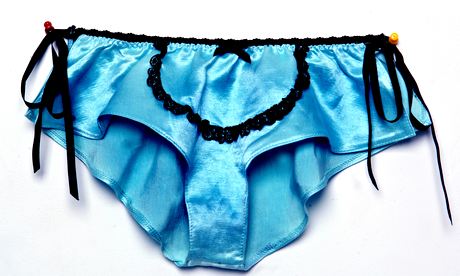Source: theguardian.com

Underwear made out of hemp and silk by Ayten Gasson. Can hemp take on cotton's dominance in the textile industry? Photograph: Sarah Lee for the Guardian
It calls its product the "friendliest fibre on the planet". But Crailar, a US company which has found a way to soften bast fibres like hemp and flax, has its beady eyes on cotton. Not as a direct competitor – they're not that big yet – but if their recent moves and shakes are anything to go by, they're certainly up for taking on the cotton/polyester hegemony that spreads throughout the global textile industry.
Intent on dispelling the impression that bast fibres have a scratchy, uncomfortable and unreconstructed hippy feel to them, Crailar has looked to paper production and worked those processes into its product.
"We started as a company called Hemp Town making clothing for clients like Universal Studios and Starbucks," explains Jay Nalbach, Crailar's chief marketing official. "You had to wash them hundreds of times to make them comfortable to wear and throwing conditioners at them didn't help either. The reason flax, hemp and linen are stiff is down to the pectins that naturally occur in the plant – like paper."
Canadian universities in the 1990s were conducting research into paper production – particularly at the bleaching stage. Paper gets its colour from the lignins and pectins that naturally occur in its fibres.
"Thanks to green chemistry and enzyme science, we worked out that naturally occurring enzymes can be used to rinse the raw fibre and remove all the pectins," says Nalbach. "What you come out with is a soft, fine fibre of flax or hemp that can be blended with cotton but is far more sustainable than 100% cotton or polyester."
Cotton is a 125m bale-a-year habit. It is the most widely used fibre across the world. Alternatives such as bast fibres (coming in at 5m bales a year) have a long way to go if they want to overthrow the global cotton hegemony.
Although Crailar sees itself as more of a complement to the cotton industry – if recent tie-ins with the likes of IKEA are anything to go by – Nalbach admits that any new fibre needs to incorporate scale and make it as easy as possible to make the switch.
"The whole industry is a two-trick pony. It's either cotton or polyester," says Nalbach. "If we can help big brands like Levi's and Target towards sustainable business practices by providing a complement, supplement or replacement to their cotton or polyester consumption, it's a big deal ... Conversion is also easy. We don't want to create a system where people need to buy new machines or make a huge capital investment in order to work with our fibre. So in our case a spinner might have to adjust the settings on their machine, but they don't have to go buy a whole new machine."
If you think of cotton, you think of smothering your face in crisp white sheets. We don't tend to think that what's being harvested is a flower and that land is intensely – often industrially – farmed to meet set global demands. The cotton plant has been genetically modified in a lab to offer a universal staple length (the length at which the fibres pull apart) and it might not be a variety indigenous to where it is being grown.
Deforestation to meet our cotton supply demands is of deep concern to Nalbach and Crailar. "We have plenty of land where we can grow plenty of fibre," he says. "Bast fibres don't need anything except sunshine and rain. You can grow it in different parts of the world and in rotation with other crops. What's great about them is that they're prolific in growth and don't require many pesticides or herbicides."
Although Crailar's production chain isn't organic, it is a conversation they are willing to have. Similarly with adopting a closed-loop production process. Nalbach says it's something they are going towards but they haven't reached yet.
"We work very closely with our brand partners – they're in it as much as we are. A lot of the folks we are talking to are getting their manufacturing facilities Blue Sign certified and they're looking into using fewer toxins or fewer dyes or less energy or creating systems that are wasteless or wastefree."
This sharing of knowledge and the willingness to have holes picked into supply chains is new to the fashion and textile industry. But it isn't new to sustainability. Nalbach says that openness has a lot to do with innovation and new businesses are smarter – they find their own niche, ringfence that and then plough forward with the business model.
"We're collaborating," he says. "Whether we're competing or not competing, we help each other out and show how we can do more with less. We like sharing how we can be more efficient and be more prudent with our resources."
Crailar technology – heavily patented, of course – appears to have simplified the fibre that comes out of plants such as flax and hemp to make them useable across the whole supply chain. They're even sold in bales, like cotton. It's as if someone has taken a hippy boyfriend and scrubbed him up to meet their parents. He's still a hippy, just a showered one.
No comments:
Post a Comment